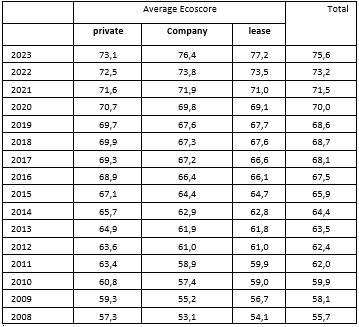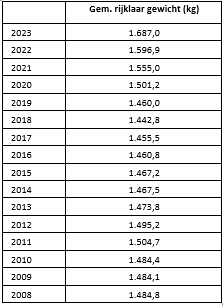Fact check lease cars
2023 broke records for leased cars, but do they really make our car fleet more sustainable?
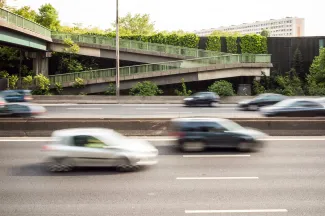
Summary
Never have so many new leased cars been registered as in 2023. Good news, at least according to the leasing and automotive industries, where for years, the mantra has been that leased cars are a good thing for the rejuvenation, and thus greening, of our car fleet. In the same breath, they also mention that in time they will also enable a greening of the second-hand market.
The reform implemented in 2021, particularly in the deductibility of company cars, was (partly) aimed at greening company cars. According to Minister Van Peteghem, tackling company cars first is the ideal lever for accelerating the greening of the Belgian car fleet. "Company cars not only drive on average more than private cars, but it is also mainly those cars that later end up on the second-hand market and thus become private cars."
Is this really the case? VITO/EnergyVille investigated, on behalf of the 3 Belgian regions and the Flanders Environment Agency VMM, whether leased cars have indeed become less polluting since the reform, and whether leased cars indeed find their way to the used private market after their contracts expire. This study was conducted within the Ecoscore indicators assignment.
Thesis 1: the leased car fleet has become greener in recent years
True, but ... it is only very recently that new leased cars have a higher Ecoscore than the new private cars, and thus provide a greening of the new passenger cars. At least until 2019, this statement did not hold true, when leased diesel cars dominated. The better performance from 2020 onwards is mainly due to an ever-increasing share of electric and plug-in hybrids. So, it can indeed be stated that the recent greening of the deductibility rules has not been missing its mark, and is expected to only increase its effect. However, a downside needs to be noted: the average weight of those electric and plug-in hybrids is a lot higher than that of their conventional counterparts. As a result, the average weight of new leased cars has increased by more than 15% over the past 4 years (after years of stagnation). The higher weight is mainly due to the large and heavy batteries with which electric and plug-in hybrid cars are now equipped. The production of these heavy cars (batteries included) also has an impact on the environment, and heavier cars are also detrimental to road safety.
Thesis 2: leased cars are mainly cars that later end up on the second-hand market and thus become private cars
Not true. After only five years, half of the leased car fleet has disappeared from the Belgian fleet (and is therefore exported, or destroyed, or ...). After 8 years, this proportion rises to as much as three-quarters. Every year, even more used cars are imported from abroad than lease cars find a 2nd life within Belgium. So, there is no sustainable greening of the Belgian car fleet through leased vehicles.
Introduction
Compared to other European countries, Belgium has a very young passenger car fleet. At the end of 2022, we only had to beat 3 member states in terms of the share of young cars in the fleet (info).
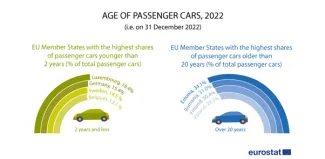
This probably won’t have been any different by the end of 2023, especially after we almost regained the numbers of the years before the pandemic in 2023 after several years of decline. Last year, just under 480,000 new cars were added to the fleet. By comparison, a year earlier the number was less than 370,000. This sharp increase is primarily due to an unprecedented increase in the proportion (and number) of new leased cars*:
- Indeed, in 2023, 4 out of every 10 new cars were leased cars, the highest share ever.
- Also in absolute numbers, 2023 was a record year: with just over 190,000 new leased cars, it even smashed the previous record set in 2019 (just over 175,000).
- For the first time, more new leased than private cars were registered (155,000).
* Leased cars refer to cars put into circulation by an authorized leasing company. Non-lease company cars are cars purchased and registered by a legal entity that is not in the leasing business. Private cars are cars registered in the name of a natural person.
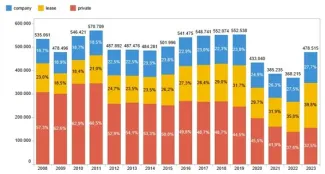
For years, the leasing and automotive industries have been stating that leased cars are a good thing for the rejuvenation, and thus greening, of our car fleet. In the same breath, they also mention that they would ensure a greener second-hand market.
For example, Febiac states that "registered vehicles naturally emerge on the second-hand market several years later, giving private buyers access to technologies they would not have access to on the new market. The rapid electrification of our vehicle fleet would go through this lever."
Renta.be (the federation of leasing companies) states that "Leased cars move on to the second-hand market after three years, and thus greener cars become more affordable for the average Belgian."
Finance Minister Peter Van Peteghem similarly comments on his reform of the deductibility rules for company cars that "just as was the case with fossil cars, electric company cars will become an important part of a high-quality second-hand car market in a few years."
Below we examine whether these 2 propositions (greening the fleet of new cars, and moving on to the second-hand market) are true.
The research
First, we examine whether leased vehicles are greening the fleet of new passenger cars.
The best way to know if one car is more environmentally friendly than another is to look at their Ecoscore. This is an environmental indicator that takes into account both exhaust emissions and the environmental impact that takes place during the production and distribution of fuel (refining crude oil into gasoline, producing electricity, etc.). The higher the Ecoscore (between 0 and 100), the more environmentally friendly. Soon we will add to this the production and recycling of the cars (and their batteries).

Since 2008, VITO/EnergyVille and the VUB (on behalf of the 3 regions and VMM) assign an Ecoscore to each car registered new or second-hand in Belgium. This allows to make a division between e.g. lease and private cars, new cars registered in Flanders vs. those registered in another region, fuels can be compared, etc. On the website, visitors can also look up these statistics themselves via various search functions (by region, lease vs. private, ...) in a handy data visualization tool.
And what did it reveal? From 2008 to 2021, new leased cars invariably had a (much) lower average Ecoscore than the new private cars. Since 2022, this has begun to change, and last year, for the first time, leased cars had the highest average Ecoscore at 77.2, and private cars the lowest (73.1). The lower performance in 2019 was due to the high proportion of diesel cars in the new lease fleet. In turn, the strong performance in recent years was due to the rising popularity of plug-in hybrid (PHEV) and electric leased vehicles (EV).
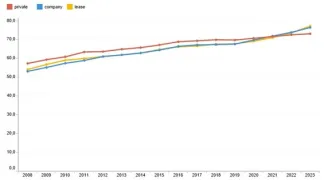
The cause of the increasing popularity of (PH) EVs is obvious: for several years, these cars have been much more fiscally interesting (mainly) due to their increased deductibility. Mid-2023, the deductibility rules were further tightened in favor of electric cars. The effects of the latter changes are only beginning to show up sparsely. This is because there is some time between when you order the car and when you actually get it registered. It is expected that the effects will only become clearly visible in the course of 2024, further accelerating the electrification of the leased car fleet. Nevertheless, we already notice a sharp increase in the share of electric cars among new leased cars in 2023: from 12.5% electric leased cars in 2022 to 28.2% in 2023. In comparison, only 5.4% of private cars were fully electric in 2023.
There is a downside, though: the average weight of those electric and plug-in hybrids is a lot higher than that of their conventional counterparts. As a result, the average weight of new cars has increased by more than 15% in the past 4 years (after years of stagnation). The higher weight is mainly due to the large and heavy batteries in these cars today. The production of those heavy cars (batteries incl.) also has an impact on the environment, and heavier cars are also detrimental to road safety.
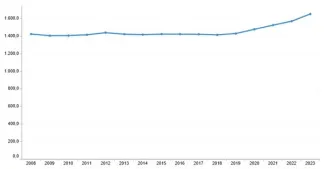
So we can thus conclude that new leased cars were less polluting than private cars in 2023, but this is only the first year that this was the case. Hence the greening of the deductibility rules is not missing its mark and is only expected to increase.
The second proposition we checked is whether leased vehicles would find their way into the fleet of used vehicles and thus accelerate the greening of the entire Belgian car fleet.
The number of cars registered second-hand is invariably higher than the number of new registrations. For example, just over 680,000 used cars were registered in 2023, compared to just under 480,000 new cars. As might be expected, the majority are registered as private cars (9 out of 10).
Since we have been tracking detailed data on leased cars since 2013, we can "follow" these cars throughout their active lives, and more specifically throughout their various registrations. And this until they are finally removed from the Belgian fleet, which means they are exported, or destroyed, or... Further analysis of this data has shown us that after 8 years, only a quarter of the original leased cars remain in the Belgian fleet, and mostly in the hands of private owners. After 10 years, it is only a fifth. This is also made visible in the figure below.
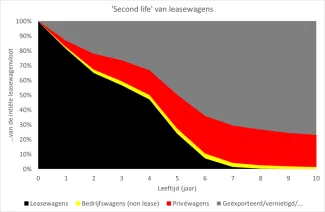
We also learn from this figure that after 5 years, already half of the leased car fleet has disappeared from the Belgian market (and thus exported, or destroyed, or ...). After 8 years, this number rises to three quarters. So there is no real long-term greening of the Belgian car fleet.
By comparison, three quarters of private cars are still on Belgian roads after eight years. Putting more effort into greening the new private cars therefore has a greater potential to make the fleet more sustainable. Or one must ensure that leased cars do stay within Belgium.
Of all the cars registered second-hand in the past 3 years, only 10% started their careers as leased cars. In fact, more cars are imported annually from abroad to be registered here as used cars than lease cars find a second life in Belgium (approx. 100,000 and approx. 70,000 per year respectively).
And what about the electric lease cars?
When we zoom in on electric leased cars, we see a similar trend for now. It was only 5 years ago that more than 2,000 new electric leased cars were registered for the first time in 1 year. Last year, there were just under 54,000. This makes little sense to make any statements at this point about a period longer than 5 years. But even among electric leased cars, we see half disappear after just 5 years. And compared to combustion engine leased cars, fewer electric leased cars are currently finding their way into the used private market: after 5 years, 23% of combustion engine leased cars are in private hands, vs. 10%. of electric leased cars. The bulk of electric leased cars are not yet end-of-contract, so it may be too early to make any statements about them. But electric used cars are in high demand in countries such as Norway and the Netherlands, where incentives are being attributed to this type of car. It is to be expected that the bulk of electric cars, as is already the case today, will be exported to these types of countries (info).
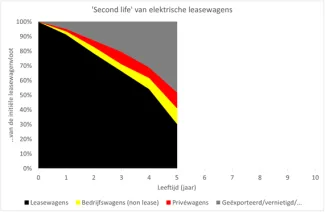
Conclusion
Thesis 1: The leased car fleet has become greener in recent years
True, but ... it is only very recently that leased cars have a higher Ecoscore than new private cars, and that mainly thanks to a large share of electric and plug-in hybrids. At least until 2019, this statement did not hold true, when diesel leased cars dominated. So the recent greening of the deductibility rules has not missed its mark, and this effect is only expected to increase. The downside is that the average weight of new leased cars has increased by 15% over the last 4 years (after years of stagnation). The higher weight is mainly explained by the large and heavy batteries with which electric and plug-in hybrid cars are now equipped.
Thesis 2: leased cars are mainly cars that later end up on the used market and thus become private cars.
Not true. Already after 5 years, half of the leased car fleet has disappeared from the Belgian fleet (and thus exported, or destroyed, or ...). After 8 years, this proportion rises to as much as three-quarters. In fact, every year more used cars are imported from abroad than lease cars find a second life within Belgium. So there is no sustainable greening of the Belgian car fleet through leased vehicles.



